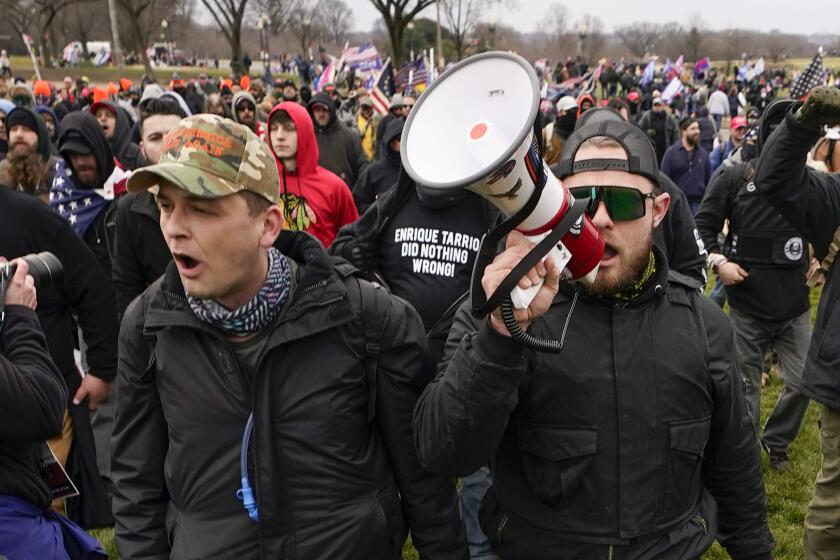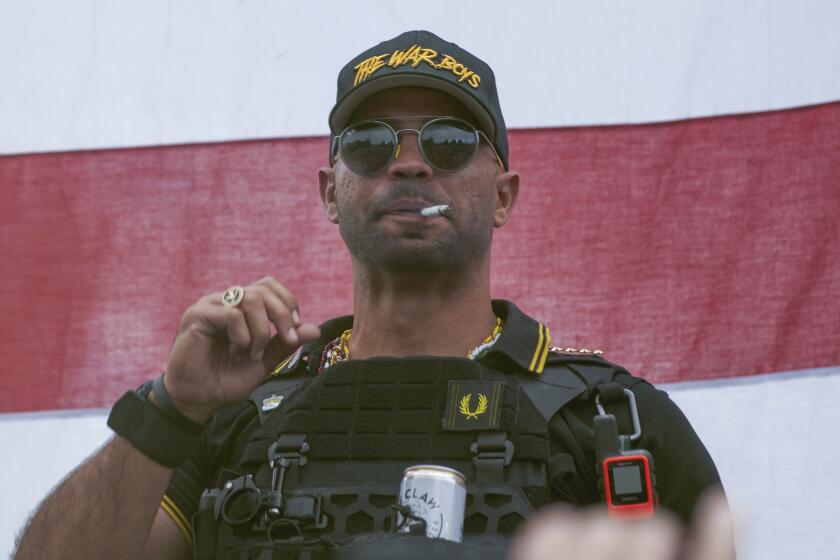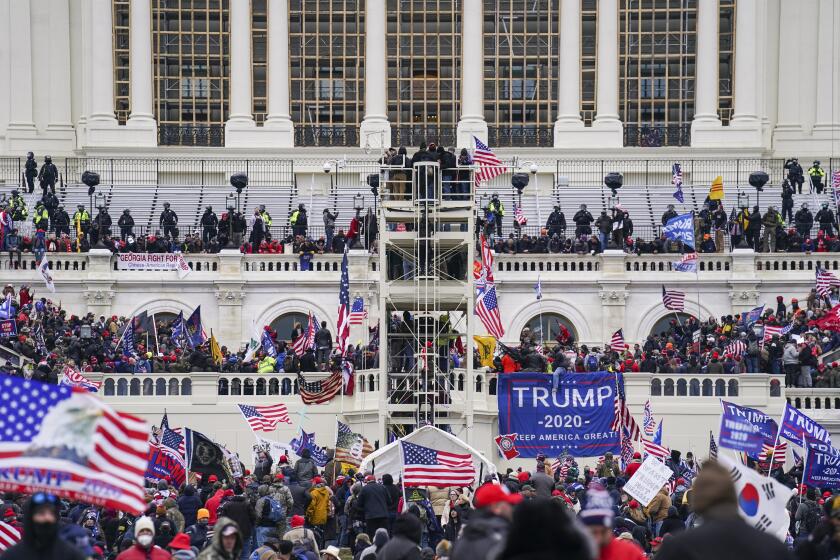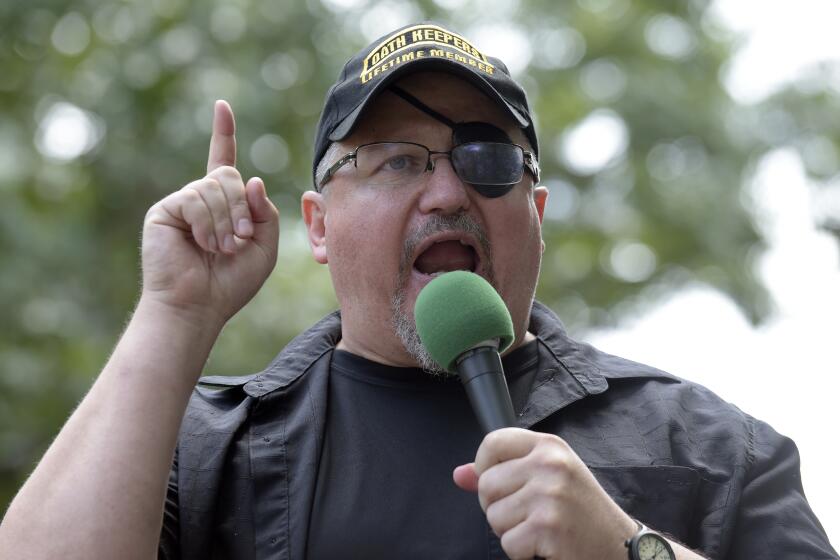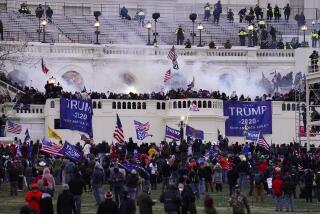Prosecutor: Proud Boys viewed themselves as ‘Trump’s army’
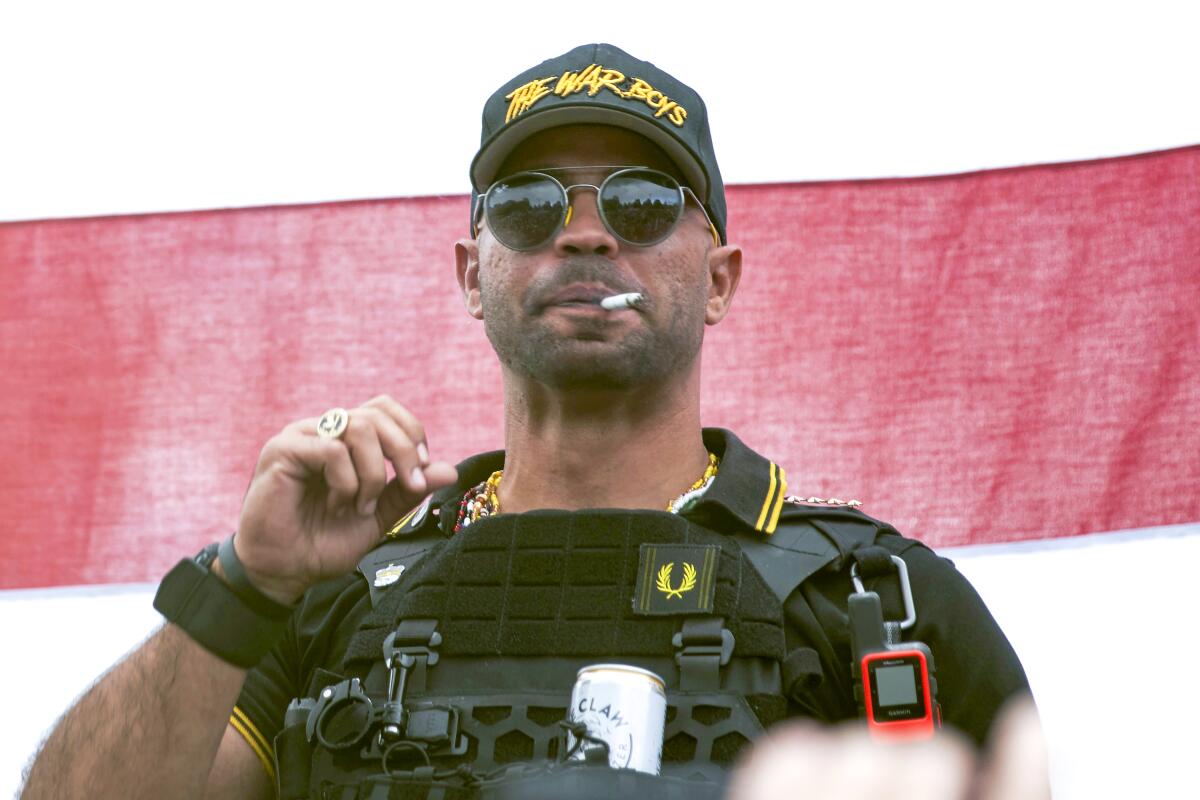
- Share via
WASHINGTON — Ready for “all-out war,” leaders of the far-right Proud Boys extremist group viewed themselves as foot soldiers fighting for Donald Trump as the former president clung to power after the 2020 election, a prosecutor said Monday at the close of a historic trial over the U.S. Capitol insurrection.
After more than three months of testimony, jurors began hearing attorneys’ closing arguments in the seditious conspiracy case accusing Proud Boys national chairman Enrique Tarrio and four lieutenants of plotting to forcibly stop the transfer of power from Trump to President Biden.
The Proud Boys were “lined up behind Donald Trump and willing to commit violence on his behalf,” prosecutor Conor Mulroe told jurors. “These defendants saw themselves as Donald Trump’s army, fighting to keep their preferred leader in power no matter what the law or the courts had to say about it.”
The prosecution’s words underscore how the Justice Department has worked throughout the trial to link the violence on Jan. 6, 2021, to the rhetoric and actions of the former president. Prosecutors have repeatedly shown jurors a video clip of Trump telling the Proud Boys to “stand back and stand by” during his first presidential debate with Biden.
Tarrio is one of the top targets of the Justice Department’s investigation of the riot, which erupted at the Capitol on Jan. 6, 2021. Tarrio wasn’t in Washington, D.C., that day but is accused of orchestrating an attack from afar.
U.S. District Judge Timothy Kelly said there’s no clear evidence of wrongdoing by the government and allowed the trial to continue Friday.
Defense attorneys say there’s is no evidence of a conspiracy or a plan for Proud Boys to attack the Capitol.
Nicholas Smith, attorney for former Proud Boys chapter leader Ethan Nordean, said prosecutors built their case on “misdirection and innuendo.” Smith accused prosecutors of repeatedly playing the clip of Trump from the debate to try to manipulate jurors.
“Does that prove some conspiracy by the men here?” Smith asked jurors. “We all know it doesn’t.”
Seditious conspiracy, a Civil War-era charge that is rare and can be difficult to prove, carries a potential sentence of up to 20 years in prison. The Proud Boys also face other serious charges.
Mulroe said a conspiracy can be an unspoken and implicit “mutual understanding, reached with a wink and a nod.”
The Justice Department has already secured seditious conspiracy convictions against the founder and members of another far-right extremist group, the Oath Keepers. But this is the first major trial involving leaders of the far-right Proud Boys, a neofacist group of self-described “Western chauvinists” that remains a force in mainstream Republican circles.
A jury has heard testimony about the Proud Boys leader’s communications with a police officer in the weeks before members of his far-right extremist group stormed the U.S. Capitol.
The foundation of the government’s case, which started with jury selection in January, is a trove of messages that Proud Boys leaders and members privately exchanged in encrypted chats — and publicly posted on social media — before, during and after the Jan. 6 attack.
The messages show Proud Boys celebrating when Trump, a Republican, told the group to “stand back and stand by” during his first debate with Biden, a Democrat. After the 2020 election, they raged online for weeks about baseless claims of a stolen election and what would happen when Biden took office.
“If Biden steals this election, [the Proud Boys] will be political prisoners,” Tarrio posted on Nov. 16, 2020. “We won’t go quietly ... I promise.”
Jurors also saw the string of gleeful messages that Proud Boys members posted during the Jan. 6 riot. A group of Proud Boys marched to the Capitol that day. Some entered the building after the mob of Trump supporters overwhelmed police lines.
“Make no mistake,” Tarrio wrote in one message. “We did this.”
Prosecutors showed multiple videos from Jan. 6 during their closing statements, including one that appeared to show defendant Zachary Rehl spraying police officers with pepper spray outside the Capitol. Confronted with the images during his testimony earlier in the trial, Rehl said he didn’t remember doing such a thing and couldn’t tell whether it was him. Mulroe said the images show “he did it and he lied under oath about it.”
Terrorism scholars say the extremist right is surviving not on the strength of its organizations but on a powerful narrative that appeals to millions.
Tarrio, a Miami resident, Nordean and Rehl are on trial with Joseph Biggs and Dominic Pezzola. Nordean, of Auburn, Wash., was a Proud Boys chapter president. Biggs, of Ormond Beach, Fla., was a self-described Proud Boys organizer. Rehl was president of a Proud Boys chapter in Philadelphia. Pezzola was a Proud Boys member from Rochester, N.Y.
Tarrio was arrested in Washington, D.C., two days before the Jan. 6 riot on charges that he burned a church’s Black Lives Matter banner during an earlier march in the city. Tarrio heeded a judge’s order to leave the nation’s capital after his arrest.
The defense attorneys called several current and former Proud Boys to the stand, trying to portray the group as a drinking club that only engaged in violence for self-defense against antifascist activists.
Rehl, the first defendant to testify, said the group had “no objective” that day. Pezzola testified that he got “caught up in the craziness” and acted alone on Jan. 6 when he used a riot shield stolen from a police officer to smash a Capitol window.
The prosecutor told jurors that the Proud Boys leaders wanted to stop Congress from certifying Biden’s victory “by any means necessary, including force.”
The conviction hands the Justice Department a major victory in its prosecutions surrounding the Jan. 6, 2021, attempt to overturn President Biden’s win.
“You want to call this a drinking club? You want to call a men’s fraternal organization? Ladies and gentlemen, let’s call this what it is … a violent gang that came together to use force against its enemies,” Mulroe said.
Key witnesses for prosecutors included two former Proud Boys members who pleaded guilty to riot-related charges and are cooperating with the government in the hopes of getting lighter sentences.
The first, Matthew Greene, testified that group members were expecting a “civil war” as they grew increasingly angry about the election results. The second, Jeremy Bertino, testified that he viewed the Proud Boys as leaders of the conservative movement and as “the tip of the spear” after the November 2020 election.
The Proud Boys’ defense mirrored arguments made by lawyers for members of the Oath Keepers, who were separately charged with seditious conspiracy. They, too, said there was no evidence of a plan for group members to attack the Capitol.
Over the course of two Oath Keepers trials, prosecutors secured seditious conspiracy convictions against Rhodes and five other members, while three defendants were acquitted of the charge. Those three, however, were convicted of obstructing Congress’ certification of Biden’s electoral victory.
Associated Press writer Alanna Durkin Richer in Boston contributed to this report.
More to Read
Sign up for Essential California
The most important California stories and recommendations in your inbox every morning.
You may occasionally receive promotional content from the Los Angeles Times.
